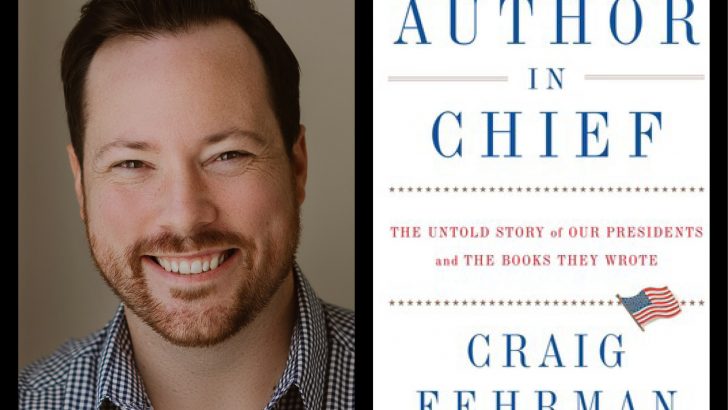Author in Chief: The untold story of our presidents and the books they wrote
by Craig Fehrman (Avid Reader Press / Simon & Schuster, $30)
Felix M. Larkin
All US presidents since Truman – including Truman – have written books, and many earlier presidents have also. These books generally fall into two categories: campaign books that seek to demonstrate why the author is a suitable candidate for the presidency; or memoirs, in which the former president tries to define his legacy and shape how history will regard him.
Few of these books, according to Craig Fehrman in this very original study of the writings of the presidents, are more than historical curiosities – though, as he also demonstrates, presidential memoirs have usually earned huge sums of money for their authors. Publishers are happy to pay for the prestige of having a former president among their authors.
Rare exceptions to the rule that books by US presidents are either campaign books or memoirs include Jefferson’s Notes on the State of Virginia (1785), Theodore Roosevelt’s The Naval War of 1812 (1882), John F. Kennedy’s Profiles in Courage (1956), and Barack Obama’s Dreams from My Father (1995).
Each of these dates from before its author’s election as president. While not obviously campaign books, they were nevertheless important in burnishing the image of the authors as serious politicians. Indeed, Obama’s campaign manager in 2008, David Plouffe, is quoted by Fehrman as saying that Dreams “got Obama elected”.
Interest
When it was first published, it failed to generate much interest despite good reviews. Reissued in 2004 when Obama emerged on the national political stage in the US, it then entered the bestseller lists – and the rest is history. He followed it with a fairly typical campaign book, The Audacity of Hope (2006).
Fehrman writes that Kennedy’s Profiles in Courage likewise “played an indispensable role in his ascent. It gave him celebrity, but it also gave him credibility”.
It has not aged well: its uplifting theme of political courage seems somewhat naive today. Moreover, there have been persistent claims that the book was essentially ghost-written for Kennedy by his long-time aide, Theodore Sorensen.
There is no doubt that the book was a collaboration between Kennedy and Sorensen, with input from a number of academics whose expert assistance on individual chapters was sought; but Fehrman goes further, claiming that Kennedy’s contribution to the book was “extremely limited”.
This view is not shared by most of Kennedy’s biographers, including the latest one, Fredrik Longvall. Longvall’s verdict is: “Without Sorensen … Kennedy likely would have produced a similar book, if less felicitous in its prose; without Kennedy, on the other hand, Profiles in Courage would not have existed.”
Acclaimed
Jefferson’s Notes, according to Fehrman, is “one of the two most important titles written by any eighteenth-century American … vivid, original and internationally acclaimed”. Fehrman also praises Roosevelt’s Naval War as a well-researched piece of historical revisionism, but he dismisses Roosevelt’s other writings – he was a prolific author, often about the natural world – as lacking “introspection or analysis”.
Among the presidential memoirs – the “legacy” books – Fehrman gives high marks to those by Ulysses S. Grant and Calvin Coolidge, neither of whom had particularly distinguished presidencies. Grant’s Personal Memoirs, published in 1885 (by Mark Twain of all people), does not actually cover his presidency. It ends with the Civil War (which was, of course, his finest hour).
It was written as he was dying from throat cancer – Fehrman records that he made the final changes to his manuscript two days before his death – and his motivation in writing it was to save his family from bankruptcy following the collapse of a brokerage firm run by one of his sons with which he had became involved after leaving the White House.
Coolidge’s Autobiography (1929) is described by Fehrman as giving “readers their first contemporary glimpse of the presidency and its human cost. It was an intimate and emotional book.” Coolidge, commonly referred to as “Silent Cal” because of his famously taciturn demeanour, had – like Kennedy and Obama – risen to national prominence partly because of a book, Have Faith in Massachusetts, published in 1920, when he was still governor of that state.
Success
Its success earned him the vice-presidential nomination of the Republican Party in 1920. The Harding-Coolidge ticket won, and Coolidge succeeded to the presidency on Harding’s death in 1923.
Of particular interest to Irish readers will be the cameo appearance in Fehrman’s book of Mathew Carey. He had been the owner and editor of Dublin’s Volunteer’s Journal in 1783-4, but he ran foul of the Irish parliament in College Green because of a cartoon published in the Journal in April 1784 and was briefly imprisoned.
On his release, with a libel case still pending against him, he absconded to America and settled in Philadelphia – where he established a printing works which in 1803 published a revised edition of Jefferson’s Notes on the State of Virginia. Fehrman tells us that “in the first part of the nineteenth century, Carey’s firm became the most powerful publisher in America”.




